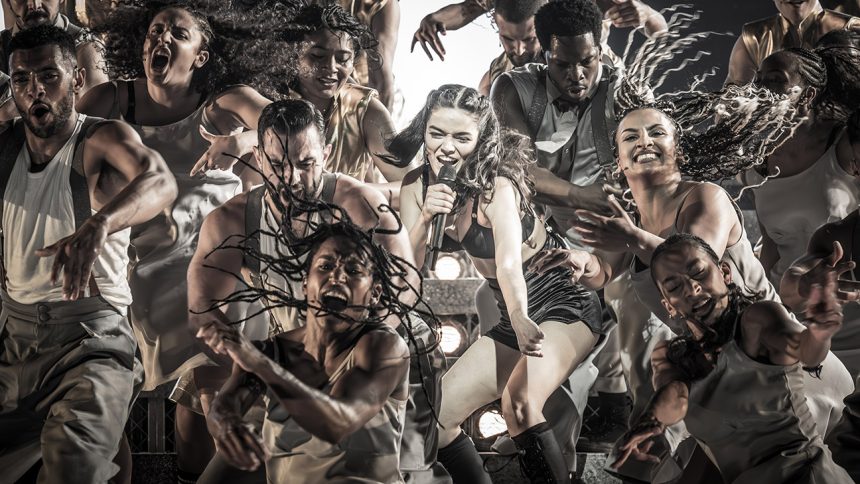‘Evita’ Theater Review: Rachel Zegler Takes London by Storm as Eva Perón in Otherwise Uneven Revival
Could it be time for Jamie Lloyd to hit the pause button? The prolific director, whose radically reimagined Sunset Blvd. last month won Tony Awards for best musical revival and lead actress Nicole Scherzinger, is rolling out productions at such a rate that his template — big stars, event theater, a style that might be described as minimalist swagger — is beginning to look entrenched, and a bit hit-or-miss.
Spectacle worked wonders with his recent, disco-dancing Much Ado About Nothing starring Tom Hiddleston and Hayley Atwell. But while there was a glorious opportunity for a revisionist take on Evita — to reconfigure the Andrew Lloyd Webber–Tim Rice mega-musical from the 1970s for a more politically confused and troubled age — Lloyd has simply turned up the volume.
The result feels decidedly erratic. The central performance from Rachel Zegler at times gives you goosebumps, but at others is in desperate need of direction; showstoppers bring usually reserved London audiences to their feet (mostly unheard of here, though it happened too during Much Ado); directorial choices damage whatever narrative interest the work might have. It’s entertaining and galling in equal measure.
As ever, the immediate set is minimal: bare, except for tiered steps that run the length of the stage and a giant sign, EVITA, across the back (in what does feel like a contemporary spin, Eva Perón is presented here more as a brand than an icon). Other than that, the staging will be accompanied by carefully selected props: the live camera that has become ubiquitous in Lloyd’s productions, a shower of blue and white confetti, blood and paint.
You Might Also Like
The show opens as a tease, the song “Requiem for Evita” sung almost as a Gregorian chant, by cowled figures gliding through dry ice. But any thought that this might be a pared-back evening are immediately cast aside as the curtain rises to reveal the Evita sign and a strutting Zegler, oozing feline sexiness in leather bra and hot pants. At the same time, Che (Diego Andres Rodriguez), an ambiguous character from Eva’s own poor background, begins his protracted debunking of the Perón legend with “Oh What a Circus.” And the musical’s real face blasts into action.
Throughout this number, and for some time after, Zegler endures her most difficult phase of the revival: physically commanding the stage (as she does the entire evening) but with a single, fixed expression, something akin to a teenager’s attempt to appear superior, that suggests there’s next to nothing going on behind the pose.
It quickly becomes apparent, too, that the evening is going to be dominated by over-miked excess — the volume way too loud, the songs pitched too shrilly. Not only can this lead, at times, to a self-defeating sensory overload, but it exacerbates the issue often raised by sung-through musicals, of plot and character simply getting lost in the mix.
While “Buenos Aires” is one of the big-belt numbers — accompanied by thrilling choreography involving the whole cast — that bring down the house, many of the production’s most satisfying moments involve a rare dialing down and focus. One is “Another Suitcase in Another Hall,” poignantly sung by Bella Brown as the discarded mistress of Juan Perón (James Olivas), in a welcome change of tempo and temperature. Another, and not surprisingly the show’s high point, is when Zegler puts her stamp on “Don’t Cry for Me Argentina.”
There was mild controversy when it was discovered in previews that Zegler would perform the show’s signature song not in the auditorium, but on the Palladium’s exterior balcony for the benefit of passers-by gathered in the street — who, horror of horrors, have not paid handsomely for a ticket.
As it turns out, this is Lloyd’s greatest stroke of inspiration (similar to what he did with Tom Francis’ Joe Gillis for the title song in Sunset Blvd. or Jessica Chastain’s Nora at the end of A Doll’s House). The theater audience does see the actress of course, captured on a giant, wide screen as she moves through the ornate Edwardian building. Her vampish garb replaced by a First Lady’s majestic white dress, bejeweled, her dark hair now white, she sings from the balcony, the camera dissolving between her cinematic close-ups and the rapt crowd. Zegler crushes the song, eking out of it every ounce of emotion, real and contrived.
The number is brilliantly conceived and executed, a genuine goosebump moment. But with the Palladium neatly filling in for Buenos Aires’ Casa Rosada, it also tellingly offers what Lloyd’s minimalist abstraction has hitherto denied: a sense of context and color.
While there was a glimpse of Eva’s feistiness and strength in the first half, Zegler as a performer is now fully unleashed. Set free from the limitations of lyricist Rice’s crass social climber, the actress finds much more expression and emotion in the second half, as Eva navigates ambition, public perception and illness. Zegler’s rendition of the dying Eva’s “You Must Love Me,” the song added for Alan Parker’s 1996 film with Madonna, is extremely moving.
It’s a pity that the men can’t really match her. Though he delivers the songs competently, Rodriguez (Sunset Blvd.) suffers in the way of all Ches. The character’s high and mighty put-downs wear thin as the show progresses, and any political objections he may have to the Peróns are undermined by smug preening.
Lloyd’s casting of Olivas as Perón — in reality 23 years Eva’s senior and invariably played by an older actor — seems perplexing. Why have a young man who looks exactly the same as the monolithic blockheads who are Perón’s followers and henchmen? Why circumvent an inescapable age dynamic in the relationship? It doesn’t help that Olivas is rather bland in the role.
Lloyd’s early reputation was partly built on an imaginative knack for tapping new meaning from the darkest and most interesting recesses of a play, notably but not only Harold Pinter’s work (Lloyd’s Betrayal, also with Hiddleston, was lauded on both sides of the Atlantic).
Evita isn’t the same kind of animal, but there’s juice in the albeit contestable nature of Perón’s political leanings. That could have resonated at a time of ever-growing right-wing populism, but is not capitalized upon here. It seems typical of the production that one brutally telling moment, Che’s face and body suddenly becoming bloodied during a Peronist march, is easily lost with the actor stranded downstage as confetti distractingly showers the audience.
Given that the director has cast Keanu Reeves and Alex Winter in his upcoming Broadway production of Waiting for Godot, there may well be an electric guitar in the mix. Nonetheless, let’s pray he doesn’t drown out the Beckett play’s marvelous silence.
Venue: The London Palladium, London
Cast: Rachel Zegler, Diego Andres Rodriguez, James Olivas, Aaron Lee Lambert, Bella Brown
Lyrics: Tim Rice
Music: Andrew Lloyd Webber
Director: Jamie Lloyd
Set and costume designer: Soutra Gilmour
Lighting designer: Jon Clark
Sound designer: Adam Fisher
Music supervisor and musical director: Alan Williams
Choreographer: Fabian Aloise
Presented by Lloyd Webber Harrison Musicals and The Jamie Lloyd Company







